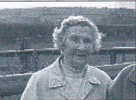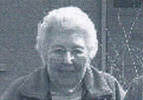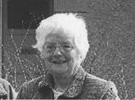|
The Glasbury Area at War - Involvement and Experiences The Memories below in blue and brown are a transcript from the Full BBC Blog last updated on the 11th April 2008 |
| The Land Army was created during the Great War in 1915 and was
organised by the Ministry of Agriculture. By the start of World War Two and in 1939 the Women's Land Army was formed. It was still under the Ministry of Agriculture and Lady Denman was appointed as the honorary Head. She organised the recruitment, enrolment, training, placement and welfare of the girls. At first it was a voluntary service but eventually conscription became necessary and the numbers rose to some 80,000 by 1944, with a mixture of local and outside labour from London to the major towns of the North East. The Women's Land Army was finally disbanded on October the 21st in 1950 and was celebrated by a march past the Queen at Buckingham Palace of 500 Land Girls. Below are the recollections of three of the land girls who worked in the Glasbury area during World War Two |
"Well, I think the best
thing I liked doing was ploughing, really. We used to go...that
was just when I came down to work on the War Ags. That was the best
days of my life, I think! It depends what you were doing of course,
I mean if you were thrashing you'd go out with the man that's got
the drum and you were cutting sheaves all day and feeding the drum
and that went on for most of the winter...to get the thrashing all
done.
"Well, when I came here I was 19, and I'd never travelled far on my own, you know and my father took me to the station and he said, well you'll see some other girls in uniform...make yourself known like, which I did. And so we travelled, I was lucky because they were coming to Brecon, so I travelled down with them like, you know, and coming now towards Glasbury looking over the countryside and I said then, ooh I'm going-we didn't know where we had to go to a hostel-and I said ooh I'm gonna live in that castle up there. But we didn't even know then that it was the hostel! And I was surprised when we got up because it were, as Rennie told you before, absolutely gorgeous you know when you saw it. And there were about 40 girls when I got in. And...one girl had told us we could sit, there were four of us sitting in this place like, you know. And we naturally sat down and had our food there and all of a sudden, well two girls it was, bounced in, well, apart from swearing at us...asking us what we were sitting in that place for, like you know, ooh it was absolutely terrifying because we were sitting in their seats you see and she told us to get out from there. Well, it so upset me did that, well all of us, you know, that I swore then that if I ever, you know new girls came I would always make sure they would have somewhere to sit because we were absolutely terrified, we were in tears really. We hadn't been used to anything like that, you know. And then the next morning we were given our jobs where to go and my first job was in the gardens, the rose garden, double digging these rose gardens. I had blisters like nobodies...because I'd never had a spade in me hand, I didn't know what it was! And then after that I went on the Commons because it were planting potato time and we were planting potatoes round the Commons like and then afterwards I had been there about two months and I was asked, well, to volunteer for tractor driving in Breconshire. So then for the next, how many years was it, about 8 years I drove tractors."
I started in the market garden and then transferred to machinery, doing threshing, planting and hoeing and so on. The War-Ag would send us out to do jobs,
farms would apply to have us for a few days and then feed us. Some
were really mean and you wouldn't even get a cup of tea, but others
were lovely and couldn't do enough for you.
|


